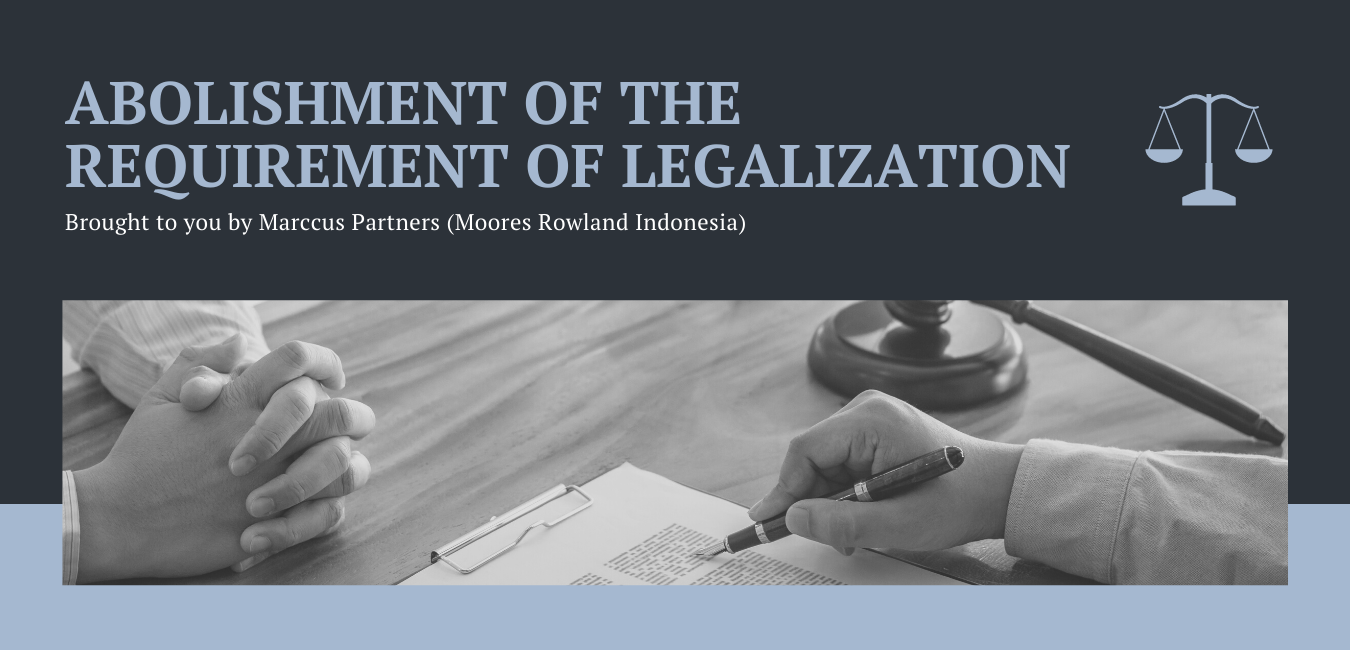Abolishment of the Requirement of Legalization Summary
March 2021
The Government of Indonesia has issued Presidential Regulation number 2 of 2021 concerning The Ratification of the Convention Abolishing the Requirement of Legalization for Foreign Public Documents ("Presidential Regulation"). The Presidential Regulation is binding and entered into force on 4 January 2021. The Presidential Regulation may provide significant changes in ensuring the correctness of documents used in another country's territory and which must be produced in said territory.
The Convention Abolishing the Requirement of Legalization for Foreign Public Documents ("The Convention") which was concluded on 5 October 1961, provides that The Convention shall apply to public documents that have been executed in the territory of one contracting State and have to be produced in the territory of another contracting State. With the Ratification of The Convention, Indonesia has officially declared itself a Contracting State to The Convention. Public Documents as referred to in The Convention, include:
a) documents emanating from an authority or an official connected with the courts or tribunals of the State, including those emanating from a public prosecutor, a clerk of a court or a process-server ("huissier de justice");
b) administrative documents;
c) notarial acts;
d) official certificates published in documents signed by persons in their private capacity, such as official certificates recording the registration of a document or the fact that it was in existence on a certain date and official and notarial authentications of signatures.
However, the President Regulation expressly regulates that the documents emanating from a prosecutor's office as the institution of a prosecution in the Republic of Indonesia, shall not be included in the public documents that have eliminated from the legalization requirements. The Convention also states that public documents as referred to above shall not apply to:
a) documents executed by diplomatic or consular agents;
b) administrative documents dealing directly with commercial or customs operations.
Furthermore, The Convention also regulates that each contracting State shall exempt from legalization documents to which The Convention applies and which have to be produced in its territory. For the purposes of The Convention, legalization means only the formality by which the diplomatic or consular agents of the country in which the document has to be produced, certify the authenticity of the signature, the capacity in which the person signing the document has acted and, where appropriate, the identity of the seal or stamp that it bears. The only formality that may be required in order to certify the authenticity of the signature, the capacity in which the person signing the document has acted and, where appropriate, the identity of the seal or stamp which it bears, is the addition of the Certificate, issued by the competent authority of the State from which the document emanates. However, the formality stated cannot be required when either the laws, regulations, or practice in force in the State where the document is produced or an agreement between two or more Contracting States have abolished or simplified it, or exempted the document itself from legalization.
Although the Presidential Regulation provides abolition of legalization, the Presidential Regulation does not state that the laws governing legalization are null and void. The laws governing legalization in Indonesia today include:
1. Attachment to the Regulation of the Minister of Foreign Affairs No. 09/A/KP/XII/2006/01, dated 28 December 2006 (point 68), stating that legalization means the validation of a document and is only for the signature and does not include the correctness of the contents of the document. Every Indonesian document that will be used in another country or foreign document to be used in Indonesia needs to be legalized by the competent authority.
2. Supreme Court of the Republic of Indonesia Verdict, dated 18 September 1986, Number: 3038 K/ Pdt/1981, which states, among others: "The validity of a power of attorney made abroad, apart from meeting the formal requirements, must be legalized first by the local Embassy."
3. The Supreme Court's verdict is also used as the Surabaya Religious High Court's basis when deciding Consideration of the Surabaya Religious High Court Verdict No. 60/Pdt.G/2008/PTA.Sby., The Surabaya High Religious Court stated, among others: "For the validity of a power of attorney made abroad, the requirements are added, namely the legalization of the Indonesian Embassy. It does not matter whether a power of attorney is in the form of an underhand or authentic; the Indonesian Embassy must legalize it. This requirement aims to provide legal certainty for the Court regarding the correctness of a power of attorney in the country concerned. With legalisation, there shall be no doubt on granting a power of attorney to the authorized."
Based on the explanation above, it may be concluded that Indonesia's government has granted abolishing the requirements of legalization through the issuance of the President Regulation, as uttered in The Convention, with an exception. Should a formality be required, the State's competent authority from which the document emanates may issue a Certificate. However, the President Regulation does not erase the currently applicable provision concerning legalization, which means it remains to be seen how this legalization abolition will be implemented in Indonesia and whether courts in Indonesia (and/or other institutions) still require legalization to provide legal certainty. Marccus Partners will provide the latest updates on the regulations, enabling clients to keep fully up-to-date.
For more information regarding Legal issues in Indonesia, you can contact:
mabel.parengkuan@marccuspartners.id


